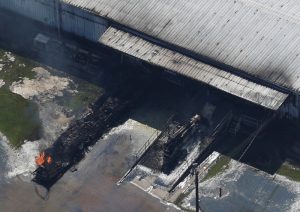
HOUSTON (Reuters) – The U.S. Chemical Safety Board on Thursday urged chemical plants to weigh the risks of natural disasters just as they would the integrity of pipes and production equipment.
“Such facilities should perform an analysis to determine their susceptibility to extreme weather events,” the board said in its final report on a chemical fire at the Arkema SA plant in Crosby, Texas, during Hurricane Harvey in August and September 2017.
“In addition, companies should assess seismic hazard maps to determine the risk of earthquakes and consider the risk of other extreme weather such as high-wind events,” the board said in the report.
Harvey dropped five feet of water on the Crosby plant, cutting off power to low-temperature warehouses meant to keep cool organic peroxides used in plastics production.
The peroxides were placed in refrigerated trailers as a last resort to keep them from decomposing and catching fire at the plant located 27 miles east of Houston.

FILE PHOTO: A fire burns at the flooded plant of French chemical maker Arkema SA after Tropical Storm Harvey passed in Crosby, Texas, U.S. August 31, 2017. REUTERS/Adrees Latif
But when flood waters cut power to the trailers, the peroxides decomposed, heated up and caught fire, forcing the evacuation of 200 people living within a 1.5 mile radius of the plant. Twenty-one people sought treatment for exposure to fumes from the blaze.
The evacuation ended after officials set fire to the storage trailers to burn up all of the peroxides.
The board, which has no enforcement or regulatory authority, recommended Arkema develop plans for flood risks at its plants and put in place multiple, redundant systems for storing chemicals.
The CSB also recommended that the American Institute of Chemical Engineers’ Center for Process Safety develop guidelines so plants can evaluate risk from extreme weather.
The board said Harris County, Texas, should update training and protective equipment to emergency responders to prevent exposure to hazardous chemicals.
Many of those exposed to the fumes from the fire were emergency responders.
(Reporting by Erwin Seba; Editing by Bernadette Baum)